May 12, 2017
Edited by David Sanders
Specimen Days
1796 Johann P Uz, German poet (Theodicee), dies at 75.
1828 Gabriel Dante Rossetti, England, poet/painter, Pre-Raphaelite figure, is born.
1845 August Wilhelm Schlegel, German poet/interpreter/critic, dies at 77.
1845 János Bacsanyi, Hungarian poet (b. 1763), dies.
1876 Henri A Esquiros, French poet (Evangile du peuple), dies at 63.
1925 Amy Lowell, American poet (b. 1874), dies.
1933 Andrey Voznesensky, Russian poet, is born.
1967 John Masefield, British writer and poet (Salt-Water Ballads), Poet Laureate (1930-67), dies at 88.

Night Clouds
The white mares of the moon rush along the sky
Beating their golden hoofs upon the glass Heavens
The white mares are all standing on their hind legs
Pawing at the green porcelain doors of the remote Heavens
Fly, mares!
Strain your utmost
Scatter the milky dust of stars
Or the tigers will leap upon you and destroy you
With one lick of his vermillion tongue
—Amy Lowell
“Scatter the milky dust of stars / Or the tigers will leap upon you and destroy you” —Amy Lowell
World Poetry
Turkey Bans Poem of Imprisoned Kurdish Leader Demirtaş

The Turkish government has banned a poem written by Selahattin Demirtaş, the co-Chair of the pro-Kurdish Peoples’ Democratic Party (HDP). “The Erdoğan-AKP government’s repression on the HDP has reached the level of utter madness. On May 2, the police raided the HDP’s office in the town of Dargeçit (Mardin province) and seized a poster displaying a photograph of our Co-chair Mr. Selahattin Demirtaş and a poem he had penned in prison, titled “Contagious Courage,”, Hisyar Özsoy, Deputy Co-chair of HDP Responsible for Foreign Affairs, said on Friday.
Chinese Younger Generation Rediscovers Ancient Poem's Roots in Music
Classics never go out of date. A piece of ancient Chinese poetry, which was written about 1,200 years ago, has recently become an online sensation among teenagers, after two young musicians composed a song for it. Two days after a namesake song of the household ancient Chinese poem "Song of a Pipa Player" was posted on Bilibili, a popular video sharing website among the younger generation, it has already earned over 20,000 hits and some 1,300 comments.
The Turkish government has banned a poem written by Selahattin Demirtaş, the co-Chair of the pro-Kurdish Peoples’ Democratic Party.
Recent Reviews
The Lost Neruda Poems
by Magdalena Edwards
Forrest Gander opens his “Prologue” to Then Come Back with an admission: “It’s true, I’ve been caught in print several times saying, ‘The last thing we need is another Neruda translation.’” His caveat: this hesitation comes not from a lack of admiration for Pablo Neruda’s verses and the “attention he’s justly received,” but rather out of a desire to “champion terrific lesser-known and more contemporary Latin American writers in translation.” I felt relief reading these lines, given my experience with Neruda’s ubiquitous, nearly biblical verse as an undergraduate and then as a graduate student writing about twentieth-century poetry across the Americas.
The Estrangement Principle
by Phillip Griffith
Ariel Goldberg borrows the title of their book-length essay on queer art, The Estrangement Principle, from the experimental writer Renee Gladman, who edited the “dyke zine” Clamour from 1996 to 1999. In a forward to an issue of that publication, Gladman wrote that the zine was intended to grapple with the difficulty of translating experience and knowledge to language, especially from a culturally marginal position like that of Clamour’s contributors, who were mostly queer women of color. Gladman describes this difficulty as a feeling of “estrangement.” As she writes in an editor’s note appended to Clamour’s fourth issue, “I want to present the difficulties I perceive one faces when speaking of experience and knowledge in language, especially when one’s sense of identity is complicated by an estrangement from the dominant culture.”
The Inky Digit of Defiance review – Tony Harrison turns 80
by Robert Crawford

Thirty years ago in Greece a friend drove the poet and dramatist Tony Harrison to a village called Askri. It was a dump. Nearby was a stinking “vast, untended, smouldering pile of rubbish and old lorry tyres”. In the village itself, a local Boeotian man made a gesture that clearly meant “Why the hell have you come?” They had come, Harrison explained, because Askri was the birthplace of the ancient Boeotian poet Hesiod. After further conversation, one of the locals said they should check out the Valley of the Muses.
Humanly Possibilist: David Shapiro’s In Memory of an Angel
by Jon Curley
David Shapiro is one of the most companionable of shape-shifters, image-makers, and meaning multipliers in contemporary American poetry. Of all the poets associated with the New York School, any generation, he prevails as the warmest and most charming. Shapiro is the kind of poet to pop up from behind, lure you into an alley, show you his blue neon dream-catcher, and teach you how it works. He also will convince you that it is much more, a lyrical instrument for catching your breath.
Mai Der Vang's and Airea D. Matthew's Striking Debuts
Vang’s “Afterland” and Matthews’s “Simulacra” are remarkable, virtuosic collections from young poets.
by Dan Chiasson
The Hmong-American poet Mai Der Vang’s début volume, “Afterland” (Graywolf), reminds us what a distinctive instrument the human imagination is, no matter what tune it plays. There is a story in this book, and an important one: Vang’s family fled Laos at the close of the Laotian “secret war,” when the C.I.A. armed the Hmong people to fight against the occupying North Vietnamese. Laos fell, the C.I.A. pulled up stakes, and many Hmong families, after languishing in refugee camps in Thailand and elsewhere, were resettled in places like Fresno, California, where Vang lives today. Vang is among the first generation of Hmong-Americans born here and writing in English. She has no firsthand memory of the trauma that shaped her. These ironies, not a little bitter, sponsor her work.
Thirty years ago in Greece a friend drove the poet and dramatist Tony Harrison to a village called Askri. It was a dump.
Broadsides
Listening to Poetry Really Can Give You Chills and Goosebumps
by Jen Viegas
“I wrote my way out of hell / I wrote my way to revolution / I was louder than the crack in the bell / I wrote Eliza love letters until she fell / I wrote about the Constitution and defended it well / And in the face of ignorance and resistance / I wrote financial systems into existence / And when my prayers to God were met with indifference / I picked up a pen, I wrote my own deliverance.” — an excerpt from “Hurricane,” as featured in Hamilton: An American Musical by Lin-Manuel Miranda. “So damn good gives me the chills,” wrote a fan of the hip-hop-inflected hit musical Hamilton in a short post online. “The anticipation and the passion lyric gives me goosebumps every time,” gushed another. New research supports the claim that rap music, classic narrative poems, and other forms of vocal delivery that incorporate rhyme and rhythmic speech can spark physical reactions in individuals, possibly because our response to such works may be innate.
Why You Should Be Reading poet Layli Long Soldier
by John Freeman

The best poetry debuts are often lexicons. You can see a poet’s career in the words they use. How eerie to recall that the word “suicide” appears on Page 1 of Sylvia Plath’s “The Colossus and Other Poems” or that Ai’s “Cruelty” opens with a vision of entrapment. “You keep me waiting in a truck," she writes in one poem, "with its one good wheel stuck in a ditch.” Writers who live between two languages face an extra challenge in their role as lexicographers of metaphor. They must create a mythology through language that acts like double-pane glass. As in, they must correct for the distortion of the words they are translating from one language to another.
In her debut collection, “Whereas,” Oglala Sioux writer Layli Long Soldier manages doubleness with the precision of a master glassblower.
Drafts & Fragments
They May Be Prison Inmates, but their Mothers Love Them
by Wilson Sayre

In the family visitors’ lounge, under paintings of Disney cartoon characters, two dozen incarcerated men at Dade Correctional Institution take turns walking up to a microphone to recite poems they wrote while in prison. They’re all dressed in the same blue prison-issued uniforms. Many of the men appeared nervous, their hands visibly shaking as they recited their personal prose from rattling pieces of papers — odes to victims of gun violence, frustrations about the criminal justice system and apologies to their mothers.
A Young Poet Tells the Story of Darfur
Emtithal "Emi" Mahmoud writes poetry of resilience, confronting her experience of escaping the genocide in Darfur in verse. She shares two stirring original poems about refugees, family, joy and sorrow, asking, "Will you witness me?"
At the Dade Correctional Institution open mic prisoners take turns reciting poems they wrote while in prison.
Poetry In the News
Joy Harjo Awarded 2017 Ruth Lilly Poetry Prize

Joy Harjo has been awarded the Ruth Lilly Poetry Prize for lifetime achievement and contribution to the art of poetry. Of Harjo’s poetry, Don Share remarks: “Her work is a thrilling and necessary antidote to false news, the ephemera of digital celebrity, and other derelictions. It pushes vigorously back against forgetfulness, injustice, and negligence at every level of contemporary life. Her work moves us because it is in the continual motion of bringing forward, with grace but also acuity, our collective story, always in progress.”
U2 to License George Elliott Clarke Poems for Concert Tour
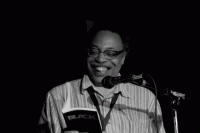
U2 frontman Bono has been known to write a few poems in his day, but starting on May 12 in Vancouver, the band will be celebrating the work of Canadian parliamentary poet laureate George Elliott Clarke. Clarke was contacted by the Third Company, which is producing visuals for U2’s Joshua Tree 30th-anniversary tour, with a request to feature his poems “Ain’t You Scared of the Sacred?: A Spiritual” and “Elegy for Leonard Cohen” for the tour.* The poems will be projected on stage screens prior to the shows.
2017 Discovery Poetry Prize Winners

Boston Review, in partnership with the 92nd Street Y Unterberg Poetry Center, proudly presents the winners of the Discovery / Boston Review 2017 Poetry Contest awarding the Joan Leiman Jacobson Poetry Prizes. Now in its seventh decade, the contest recognizes and celebrates exceptional work by poets who have not yet published a first book. Many of the contest’s past winners—including John Ashbery, Mary Jo Bang, Lucille Clifton, Nick Flynn, Debora Greger, Sherod Santos, and Mark Strand—have gone on to distinguished writing careers.
Cobb Student Wins National Poetry Competition, $20,000
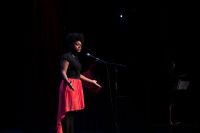
Huggins won a national prize and $20,000 in the 2017 Poetry Out Loud contest. Samara Elán Huggins, a senior at Whitefield Academy in Mableton won a $20,000 prize and the title of 2017 Poetry Out Loud National Champion Wednesday.
Joy Harjo has been awarded the Ruth Lilly Poetry Prize for lifetime achievement and contribution to the art of poetry.
New Books
Where Is North by Alison Jarvis
[Paperback] Silverfish Review Press, 88 pp., $16.00
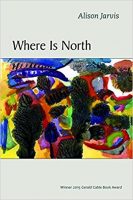
"In Alison Jarvis' extraordinary Where Is North, a life unfolds between breath-taking love poems. There's a powerful arc, but it's a vortex, more visceral than linear. Dramatic moments enclose each other like Russian dolls, 'the future falling back into itself,' so that the air between I and Thou becomes charged with the trials of childhood, the rigors of history, the mirror-life of dreams…Where Is North is a profoundly necessary book for our strange era."—D. Nurkse
Ephemerist by Lisa Bickmore
[Paperback] Red Mountain Press, 74 pp., $18.95
In Ephemerist, the speakers of the poems imagine many provisional homes. They make a study of shelter: in the harbors of memory; in art's forms and improvisations; in spirit houses; in the body. Each proves transient. In these poems, each speaker finds that the places she thinks she knows are, in the end, knowable only tangentially and partially, if at all. Shelter is a pharmakon, a substance that is both medicine and toxin. The book imagines, as substitution and remedy, a practice of making what cannot last, what will always disappear, a practice that might be termed ephemerism. One speaker seeks an "empty nave where / the icon should go," suggesting that if it could contain "just the idea / of an altar, I would worship there." This seeking is a kind of "vigil on which nothing depend[s]," a radical freedom that is both burden and blessing.
Queen Kong by Amanda J. Bradley
[Paperback] NYQ Books, 88 pp., $15.95
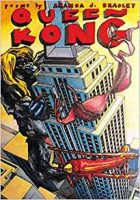
Queen Kong opens with an autobiographical poem chronicling childhood through graduation from college. This not only informs the reader but also clearly infuses subtle meaning throughout the remainder of the book's poems, which are all lyric in nature. It is this subtlety that poignantly pervades the crown section of the book: a collection of hard-hitting feminist poems that Bradley wrote in dialogue with famous feminists across history. Queen Kong takes the reader by storm, just like her male counterpart took New York, except Queen Kong is a powerful journey for women (and men) everywhere.
Phrasis by Wendy Xu
[Paperback] Fence Books, 80 pp., $15.95
Wendy Xu articulates the whole world by freezing it all at once, looking closely at its parts, and zeroing in on the one image or phrase or feeling that makes the day seem possibly beautiful under all the scaffolding, sirens, and other natural (analog and online) interruptions that make up daily living.
Suture by Simone Muench and Dean Rader
[Paperback] Black Lawrence Press, 65 pp., $15.95
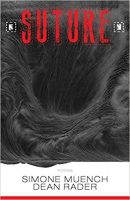
"The endurance of the sonnet sequence over the centuries is in no small measure due to a paradox: it is a form that revels both in its fluidity and in its structural exactitude. The sonnet sequence is also apt to engage us because it is typically an expression of solitary yearning, just like the blues. Petrarch longs for his unattainable Laura; Son House laments his dead beloved. In Suture, Simone Muench and Dean Rader turn this latter convention of the sonnet sequence on its head, transforming a mode that seems predicated on an essential loneliness into a collaborative effort, one that is rambunctious, wry, companionable, jittery; and, above all, emotionally capacious. Muench and Rader write with an elegant but mysterious synchronicity—like octet and sextet."—David Wojahn
Queen Kong opens with an autobiographical poem chronicling childhood through graduation from college.
Correspondences
Ben Lerner on the Porous Boundaries of Literature, Truth, and Plagiarism
by Emily Temple
On Tuesday night, Ben Lerner took the stage at BAM as part of their Eat, Drink & Be Literary series—a truly delightful (and remarkably well-organized) event that offers music, dinner, wine, a reading, and a great literary conversation on stage. In his conversation with New Yorker fiction editor Deborah Treisman, Lerner discussed the bleed-through of literary genres (including fact, fiction, and whatever counts as political speech these days), selling out, and the responsibility of the artist in these trying times. A few highlights from their conversation and the following audience question and answer session are below, edited for length and clarity.
Multiplicity: An Interview with Ian Hatcher
by Steven Wingate
Ian Hatcher creates digital and print literature, but resides in the borderlands of each, where computation and language inform and embrace each other. He collaborated on the digital/print hybrid book Abra: A Living Text (Center for Book Arts, 2015) with Amaranth Borsuk and Kate Durbin, and his solo books include The All-New (Anomalous Press, 2015) and most recently Prosthesis (Poor Claudia, $17.50). I met Ian when our work was exhibited side by side at the International Symposium on Electronic Art in Hong Kong this past May. When I saw him read from Prosthesis, I knew this was a young writer whose career I had to start tracking.
Ben Lerner recenty took the stage as part of Eat, Drink & Be Literary —a delightful event that offers music, dinner, wine, and a reading.
Envoi: Editor’s Notes
Titles
I recently tried to help someone come up with a compelling or evocative title for her book of poems, which is due for publication in a year. Although she had a working title, it was the sort whose full effect could only be discerned if you knew the proper context, in this case a poem late in the book.
This got me looking over my poetry books, trying to determine what it was that appealed to me as a reader without reference to the actual poems in the book. I don't know that there's any one thing or even if there is an appreciable pattern or tone. I suppose there is generally an image or tone that is evoked, but not always. Here are a sampling of my favorites:
Millions of Strange Shadows
Bells in Winter
Accidental Weather
The Summer Anniversaries
What the Light Was Like
Fresh Peaches, Fireworks, and Guns
Days We Would Rather Know
(any commonality there?—don't know. . . )
I did manage to come up with a fair list of possible titles for her based on snippets from the poems in the book. I'm not sure they were any better than her original title, or that her sensibility necessarily matches mine when it comes to such things. We'll have to wait for the final draft.

What makes for a good poetry collection title?